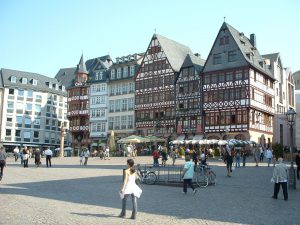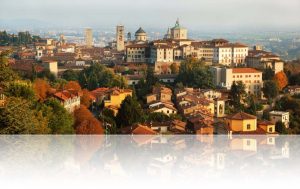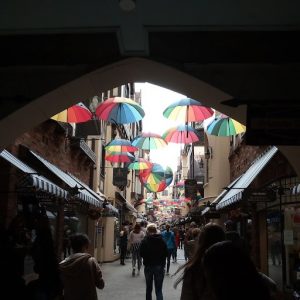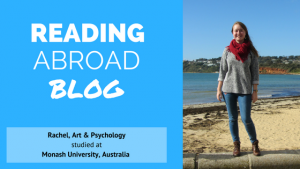Institute of Education lecturer Dan James recalls his own study abroad experience and how it has positively impacted his career:
So, if you are worried about doing the ERASMUS programm e and what it will be like living in a foreign country, that’s the very reason that you should do the ERASMUS programme. My experience was many moons ago but having started writing about it has brought back many great memories. Quite simply, living in Frankfurt, Germany for 3 months carrying out my research project was c. Let me explain why:
e and what it will be like living in a foreign country, that’s the very reason that you should do the ERASMUS programme. My experience was many moons ago but having started writing about it has brought back many great memories. Quite simply, living in Frankfurt, Germany for 3 months carrying out my research project was c. Let me explain why:
The language:
In my first two weeks we undertook an intensive German course and this really helped (I had previously studied a German GCSE). Here I made friends with students from Portugal, Spain, Italy, America and many more countries. During weekends, we would often visit local towns and visit other attractions such as the outside ice skating in Frankfurt. The common language of the group was English which made it easy to communicate. So, if you are not fluent in a language, don’t worry. If you are keen to learn and immerse yourself in it, you will soon be able to have basic conversations with people. I carried a dictionary everywhere I went, and would read all the signs I could. as well as picking up free newspapers to read on the train journey to the university. German TV often has English subtitles so you quickly pick up words (I watched a lot of German MTV!). At first, the response from the other person would instantly be, “Woher kommst du?” (Where do you come from). My reply, “aus England” would then mean that they would then use it as an opportunity to practice their English. By the end of the three months, I could have a conversation with someone in German and although they could usually detect that my accent perhaps wasn’t local, they wouldn’t instantly divert to English.
Living in a house with international students:
I was living in a house with two other German students. This was a new experience for me as before then I had been living in halls. I asked them to speak to me in German but when I didn’t understand we spoke in English and their English was so good. They introduced me to many German delights such as Gluhwein and Bratwurst at the German Christmas markets. To say thank you for their patience with me, I attempted to cook them a ‘full English breakfast’. However, doing this was not quite the same thing when using German sausage and bacon! You quickly learn to translate the cooking instructions (or not) on the side of packets, although that doesn’t excuse me cooking a pizza with the plastic bottom still on!
The lab:
I was working in a lab with a very international mix of students and in my first couple of weeks there we went to the Alps in Austria for a team conference. I say conference…there were some talks from the group and then in the afternoon we would hike a mountain or play volleyball, followed by lots of weiss beer. Again, this was an opportunity to make friends. It was a really great experience working in a proper research lab and learning new techniques. I would have also been working in a lab in my home university but here I had one-to-one supervision from my supervisor. I don’t think I would have received this level of support from my home university. I want to stress, this one-to-one supervision was unique to this situation and helped me learn so much but not something you should expect as part of your ERASMUS time.
Travelling / the Oktoberfest
 One of my new lab friends, Jin (from China) and I, decided to travel to the Oktoberfest in Munich. As we couldn’t afford the rail fare for the intercity we took the local trains. 10 hours later at about 9pm, we made it! This was our first mistake. As we were so late all the beer tents were packed and we couldn’t get in. Our second mistake was not booking any accommodation (and there wasn’t any available). We ended up sleeping (or trying to sleep) on a park bench in a freezing cold October night. I don’t think I have ever been so cold! However, it was nothing that a couple of pints of pilsner and a weisswurst for breakfast couldn’t sort out. And I still remember the song that people were singing in the tube on the exit from Munich!
One of my new lab friends, Jin (from China) and I, decided to travel to the Oktoberfest in Munich. As we couldn’t afford the rail fare for the intercity we took the local trains. 10 hours later at about 9pm, we made it! This was our first mistake. As we were so late all the beer tents were packed and we couldn’t get in. Our second mistake was not booking any accommodation (and there wasn’t any available). We ended up sleeping (or trying to sleep) on a park bench in a freezing cold October night. I don’t think I have ever been so cold! However, it was nothing that a couple of pints of pilsner and a weisswurst for breakfast couldn’t sort out. And I still remember the song that people were singing in the tube on the exit from Munich!
Activities outside of studying:
At the time, I was also a competitive trampolinist. I found a club in Frankfurt that was coached by the German National Youth Coach. I was trampolining with a Ukranian international who I was in awe of as well as some kids who used to go, “schau mal” (look at me). I was invited to a German squad demo exhibition. Here the best German trampolinists were competing inside a ferrari garage in Frankfurt. It was surreal. I had to pinch myself. I was watching elite athletes in my sport, surrounded by expensive cars, in a different country.
When I came back / what happened afterwards.
I was able to do a German proficiency exam and scrape a pass which was added to my degree transcript. However, some people go to Germany and don’t speak a word of German the entire time they are there. You can survive without, but for me it was an important part of immersing myself in the culture.
Most importantly, it gave me a renewed energy for my studies. After 3 years, I had become jaded and my final year, including my ERASMUS Autumn term was definitely my happiest and most focused year.
It is only through having this experience that in my later adult life, I decided to have a gap year where I went to become a ski instructor in Austria for a season. I had to do the ski instructor course and sit the exam in German – it was hard work. The best bit was a beat some of the native speakers in the theory exam! Without my ERASMUS experience, I am not sure if I would have been happy to travel to a country by myself with no certainty of work.
This is the first time I have recounted some of these stories from 15 years ago. That is what the ERASMUS programme gave me…unique experiences and an understanding of another country and its people. I would absolutely make the same choice if I could go back in time.
As a result, I am now passionate about supporting the Study Abroad students in the Institute of Education and would love to hear from any of our home students from the IoE in Reading who are interested in talking about doing ERASMUS next year, whether that be in Germany or elsewhere. I might even tell you the stories that I couldn’t tell here! 🙂




 The strategy states that it is our institutional: “… long-term ambition to be the greenest university in the UK, we will lead by example and commit to genuine carbon neutrality by 2030…”. (https://www.reading.ac.uk/about/strategy.aspx )
The strategy states that it is our institutional: “… long-term ambition to be the greenest university in the UK, we will lead by example and commit to genuine carbon neutrality by 2030…”. (https://www.reading.ac.uk/about/strategy.aspx ) e and what it will be like living in a foreign country, that’s the very reason that you should do the ERASMUS programme. My experience was many moons ago but having started writing about it has brought back many great memories. Quite simply, living in Frankfurt, Germany for 3 months carrying out my research project was c. Let me explain why:
e and what it will be like living in a foreign country, that’s the very reason that you should do the ERASMUS programme. My experience was many moons ago but having started writing about it has brought back many great memories. Quite simply, living in Frankfurt, Germany for 3 months carrying out my research project was c. Let me explain why: One of my new lab friends, Jin (from China) and I, decided to travel to the Oktoberfest in Munich. As we couldn’t afford the rail fare for the intercity we took the local trains. 10 hours later at about 9pm, we made it! This was our first mistake. As we were so late all the beer tents were packed and we couldn’t get in. Our second mistake was not booking any accommodation (and there wasn’t any available). We ended up sleeping (or trying to sleep) on a park bench in a freezing cold October night. I don’t think I have ever been so cold! However, it was nothing that a couple of pints of pilsner and a weisswurst for breakfast couldn’t sort out. And I still remember the song that people were singing in the tube on the exit from Munich!
One of my new lab friends, Jin (from China) and I, decided to travel to the Oktoberfest in Munich. As we couldn’t afford the rail fare for the intercity we took the local trains. 10 hours later at about 9pm, we made it! This was our first mistake. As we were so late all the beer tents were packed and we couldn’t get in. Our second mistake was not booking any accommodation (and there wasn’t any available). We ended up sleeping (or trying to sleep) on a park bench in a freezing cold October night. I don’t think I have ever been so cold! However, it was nothing that a couple of pints of pilsner and a weisswurst for breakfast couldn’t sort out. And I still remember the song that people were singing in the tube on the exit from Munich!










 I honestly don’t think I would have had even half of the experience that I had if it wasn’t for the funding that I got from Erasmus +. To be completely honest I don’t know that I would have been able to afford to go at all. The Erasmus+ funding was such a huge part of my experience of studying in Venice, because of the money it meant I felt comfortable enough to go to social outings and meet new people and not worry about spending a bit of money while I was there, I was able to afford Italian lessons that helped me improve and feel comfortable in my surroundings.
I honestly don’t think I would have had even half of the experience that I had if it wasn’t for the funding that I got from Erasmus +. To be completely honest I don’t know that I would have been able to afford to go at all. The Erasmus+ funding was such a huge part of my experience of studying in Venice, because of the money it meant I felt comfortable enough to go to social outings and meet new people and not worry about spending a bit of money while I was there, I was able to afford Italian lessons that helped me improve and feel comfortable in my surroundings.






















